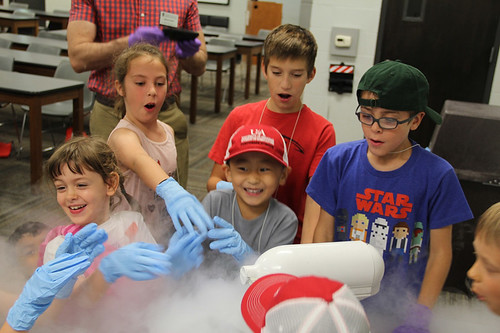U of A scientists warn against using liquid nitrogen with kids’ foods
By Robby Edwards
Dale Bumpers College of Agricultural, Food and Life Sciences
Fast Facts:
- Dipping frozen desserts in liquid nitrogen is a growing trend
- The trend poses potential health risks
- The evaporating gas should never be ingested
(325 words)
Download PHOTO from Flickr: https://flic.kr/p/2ap9wBx
FAYETTEVILLE, Ark. — A growing trend of dipping frozen deserts in liquid nitrogen shortly before serving poses several potential health risks, according to food science and food safety professors at the University of Arkansas System Division of Agriculture.

Treats made by dipping food items in liquid nitrogen immediately before serving produce extremely cold vapors. When placed in the mouth, those nitrogen vapors can come out of the nose and mouth. Liquid nitrogen is extremely cold. It hits its boiling point at -324 degrees and changes from a liquid to a gas. This transformation produces possible health risks, including internal and external burns, and internal complications when the gas expands in the stomach.
“Liquid nitrogen is a chemical used in many cooling and cryogenic applications,” said Ya-Jane Wang, professor of carbohydrate chemistry. “It can be used in a variety of food preparations from commercial industry to gourmet restaurants but should never be ingested.”
Wang and Sun-Ok Lee, professor of nutrition, are both food scientists with the University of Arkansas System Division of Agriculture and the U of A’s Dale Bumpers College of Agricultural, Food and Life Sciences.
They recently discussed potential hazards of consuming food dipped in liquid nitrogen with elementary school children visiting the Fayetteville campus as part of the Summer STEM Camp.
They offered the students a few warnings, and suggested one alternative:
- Be cautious because liquid nitrogen is colorless, tasteless and odorless.
- The extremely cold temperature can burn and damage human tissue.
- Make sure all liquid nitrogen is evaporated.
- Use under proper supervision.
- A safer liquid nitrogen dessert alternative is ice cream because there’s more time for evaporation of the nitrogen.
The summer camp was hosted by Bumpers College’s departments of animal science, food science and horticulture in partnership with the Center for Mathematics and Science Education.
For more information on food science, food safety and food science STEM camps or departmental tours, please email student relations coordinator Rosa Buescher at rosab@uark.edu.
About the Dale Bumpers College of Agricultural, Food and Life Sciences: Bumpers College provides life-changing opportunities to position and prepare graduates who will be leaders in the businesses associated with foods, family, the environment, agriculture, sustainability and human quality of life; and who will be first-choice candidates of employers looking for leaders, innovators, policy makers and entrepreneurs. The college is named for Dale Bumpers, former Arkansas governor and longtime U.S. senator who made the state prominent in national and international agriculture.
About the Division of Agriculture
The University of Arkansas System Division of Agriculture’s mission is to strengthen agriculture, communities, and families by connecting trusted research to the adoption of best practices. Through the Agricultural Experiment Station and the Cooperative Extension Service, the Division of Agriculture conducts research and extension work within the nation’s historic land grant education system.
The Division of Agriculture is one of 20 entities within the University of Arkansas System. It has offices in all 75 counties in Arkansas and faculty on five system campuses.
Pursuant to 7 CFR § 15.3, the University of Arkansas System Division of Agriculture offers all its Extension and Research programs and services (including employment) without regard to race, color, sex, national origin, religion, age, disability, marital or veteran status, genetic information, sexual preference, pregnancy or any other legally protected status, and is an equal opportunity institution.
Media Contact: Fred Miller
U of A Division of Agriculture
Arkansas Agricultural Experiment Station
(479) 575-5647
fmiller@uark.edu
Related Links